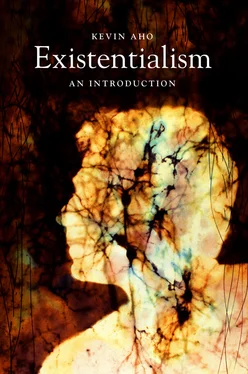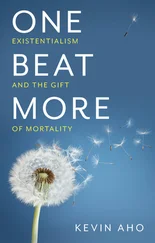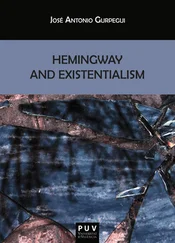Dostoevsky, F. (1990). The brothers Karamazov . (R. Pevear and L. Volokhonsky, trans.) San Francisco: North Point Press.
Dostoevsky, F. (2009). Notes from the underground . (C. Garnett, trans.) Indianapolis: Hackett.
Dreyfus, H. (1972). What computers can't do: A critique of artificial reason . New York: Harper and Row.
Dreyfus, H. (1991). Being-in-the-world: A commentary on Heidegger's Being and Time, division 1 . Cambridge, MA: MIT Press.
Dreyfus, H. (2009). The roots of existentialism. In H. Dreyfus and M. Wrathall (eds.), A companion to phenomenology and existentialism (pp. 137–161). Oxford: Blackwell.
Dreyfus, H. (2012). ‘What a monster then is man': Pascal and Kierkegaard on being a contradictory self and what to do about it. In S. Crowell (ed.), The Cambridge companion to existentialism (pp. 96–110). New York: Cambridge University Press.
Dreyfus, H., and H. Hall (eds.) (1992). Heidegger: A critical reader . Oxford: Blackwell.
Dreyfus, H., and M. Wrathall (eds.) (2002). Heidegger reexamined . (Vols. 1–3). New York: Routledge.
Dreyfus, H., and M. Wrathall (eds.) (2009). A companion to phenomenology and existentialism . Oxford: Blackwell.
Dunning, S. N. (1985). Kierkegaard's dialectic of inwardness: A structural analysis of the theory of stages . Princeton, NJ: Princeton University Press.
Dupré, L. (1963). Kierkegaard as theologian: The dialectic of Christian existence . New York: Sheed and Ward.
Ellison, R. (1995). Invisible man . 2nd ed. New York: Vintage Books.
Elrod, J. W. (1981). Kierkegaard and Christendom . Princeton, NJ: Princeton University Press.
Evans, C. S. (1992). Passionate reason: Making sense of Kierkegaard's Philosophical Fragments . Bloomington: Indiana University Press.
Evernden, N. (1985). The natural alien: Humankind and environment . Toronto: University of Toronto Press.
Fanon, F. (1967). Black skin, white masks . (C. Markmann, trans.) New York: Grove Press.
Fell, J. P. (1979). Heidegger and Sartre: An essay on being and place . New York: Columbia University Press.
Ferguson, H. (1995). Melancholy and the critique of modernity: Søren Kierkegaard's religious philosophy . London: Routledge.
Ferreira, M. J. (1991). Transforming vision: Imagination and will in Kierkegaardian faith . Oxford: Clarendon Press.
Fischer, J. M. (1994). The metaphysics of free will . Oxford: Blackwell.
Flynn, T. (1984). Sartre and Marxist existentialism . Chicago: University of Chicago Press.
Flynn, T. (2006). Existentialism: A very short introduction . Oxford: Oxford University Press.
Foley, J. (2008). Albert Camus: From the absurd to revolt . Montreal: McGill-Queens University Press.
Foucault, M. (1980). Two lectures. In C. Gordon (ed.), Power/knowledge: Selected interviews and other writings, 1972–1977 (pp. 78–108). New York: Pantheon Books.
Foucault, M. (1991). The birth of the clinic: An archaeology of medical perception . (A. Sheridan, trans.) New York: Vintage Books.
Foucault, M. (1994). The order of things: An archaeology of the human sciences . New York: Random House.
Frank, J. (1976). Dostoevsky: The seeds of revolt, 1821–1849 . Princeton, NJ: Princeton University Press.
Frankfurt, H. (1971). Freedom of the will and the concept of a person. Journal of philosophy 68 (1): 5–20.
Frede, D. (2006). The question of being: Heidegger's project. In C. Guignon (ed.), The Cambridge companion to Heidegger (pp. 42–69). Cambridge: Cambridge University Press.
Freud, S. (1964). Standard edition of the complete psychological works of Sigmund Freud , vol. 22. (J. Strachey, trans.) London: Hogarth Press.
Friedman, M. S. (ed.) (1964). The worlds of existentialism: A critical reader . New York: Random House.
Fuchs, T. (2005). Corporealized and disembodied minds: A phenomenological view of the body in melancholia and schizophrenia. Philosophy, psychiatry, and psychology 12 (2): 95–107.
Furtak, R. (2005). Wisdom in love: Kierkegaard and the ancient quest for emotional integrity . Notre Dame, IN: University of Notre Dame Press.
Gadamer, H. G. (1994). Heidegger's ways . (J. W. Stanley, trans.) Albany: State University of New York Press.
Gallagher, S. (2005). How the body shapes the mind . Oxford: Oxford University Press.
Gardiner, P. (2002). Kierkegaard: A very short introduction . Oxford: Oxford University Press.
Gardner, S. (2010). Sartre's being and nothingness: A reader's guide . London: Continuum.
Garrido, M. (2010). Ortega y Gasset's heritage in Latin America. In S. Nuccetelli, O. Schutte, and O. Bueno (eds.), A companion to Latin American philosophy (pp. 142–155). Oxford: Blackwell.
Gates, H. L. Jr., and C. West (1997). The future of the race . New York: Vintage Books.
Giles, J. (ed.) (1999). French existentialism: Consciousness, ethics and relations with others . Amsterdam: Rodopi.
Giles, J. (ed.) (2008). Kierkegaard and Japanese thought . Basingstoke: Palgrave Macmillan.
Gillespie, M. A., and T. B. Strong (eds.) (1988). Nietzsche's new seas: Explorations in philosophy, aesthetics, and politics . Chicago: University of Chicago Press.
Golomb, J. (1987). Nietzsche's enticing psychology of power . Ames: Iowa State University Press.
Gordon, H. (ed.) (1999). Dictionary of existentialism . Westport, CT: Greenwood Press.
Gordon, L. (1997). Existential dynamics of theorizing black invisibility. In L. Gordon (ed.), Existence in black: An anthology of black existential philosophy (pp. 69–80). New York: Routledge.
Gordon, L. (ed.) (2000). Existentia Africana: Understanding African existential thought . New York: Routledge.
Gouwens, D. J. (1996). Kierkegaard as religious thinker . Cambridge: Cambridge University Press.
Greene, N. (1960). Jean-Paul Sartre: The existential ethic . Ann Arbor: University of Michigan Press.
Grene, M. (1948). Dreadful freedom: A critique of existentialism . Chicago: University of Chicago Press.
Grene, M. (1973). Sartre . New York: New Viewpoints.
Grene, M. (1976). Introduction to existentialism . Chicago: University of Chicago Press.
Grossman, R. (1984). Phenomenology and existentialism: An introduction . New York: Routledge and Kegan Paul.
Guignon, C. B. (1983). Heidegger and the problem of knowledge . Indianapolis: Hackett.
Guignon, C. B. (1993). Editor's introduction. In C. Guignon (ed.), Dostoevsky's The grand inquisitor and related chapters in The brothers Karamazov (pp. ix — xliii). (C. Garnett, trans.) Indianapolis: Hackett.
Guignon, C. B. (2004a). On being authentic . London: Routledge.
Guignon, C. B. (2004b). Existentialism. In E. J. Craig (ed.), Encyclopedia of philosophy . New York: Routledge.
Guignon, C. B. (ed.) (2006). The Cambridge companion to Heidegger . 2nd ed. Cambridge: Cambridge University Press.
Guignon, C. B., and K. Aho (2009). Editor's introduction. In G. B. Guignon and K. Aho (eds.), Dostoevsky's Notes from the underground (pp. vii — xxxvii). Indianapolis: Hackett.
Guignon, C. B., and D. Pereboom (eds.) (2001). Existentialism: Basic writings . 2nd ed. Indianapolis: Hackett.
Haar, M. (1996). Nietzsche and metaphysics . (M. Gendre, trans.) Albany: State University of New York Press.
Hale, G. A. (2002). Kierkegaard and the ends of language . Minneapolis: University of Minnesota Press.
Читать дальше












